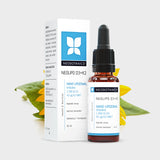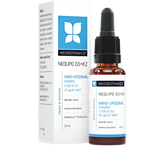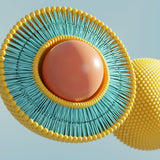NEOLIPO D3+K2 - Nano liposomal form of high doses of vitamins D3 and K2, dietary supplement
- In the form of a water-soluble liquid concentrate
- Easy to dose in water, fruit juice, or cold or lukewarm tea
- Extremely strong formulation - contains 500% of the recommended daily intake of vitamin D3 and 60% of K2 in a daily dose
- Without dyes and aromas
- Made using NEOMICELLE™ technology, developed as part of research grant projects
Vitamin D contributes to:
- normal function of the immune system
- maintaining normal bones and teeth
- maintaining normal muscle function
- normal absorption/utilization of calcium and phosphorus
- normal blood calcium levels
Vitamin K contributes to:
- normal blood clotting
- maintaining normal bone condition
The Czech population suffers from a vitamin D deficiency. This is essential for strengthening immunity (1). Very few foods naturally contain or are enriched with vitamin D. People obtain it from exposure to sunlight, from a diet rich in fatty fish, or from medications and dietary supplements. It is estimated that up to 1 billion people worldwide may suffer from vitamin D deficiency. Therefore, it is absolutely necessary to supplement vitamin D, whether in natural, natural form - the sun, fish, or in artificial form, i.e. medications and specialized dietary supplements.
Vitamin D deficiency affects a large part of the elderly population, especially women living in countries with a temperate climate, due to reduced vitamin D intake in the diet (mainly from the consumption of fatty marine fish). The lowest seasonal concentration of the active form of vitamin D is usually observed during winter and spring. It is particularly alarming that more than 50% of postmenopausal women taking osteoporosis medications have insufficient levels of the active form of vitamin D3 in their blood, as shown, for example, by a study by Boston University (2). A study conducted among outpatients in Denver showed vitamin D deficiency in as many as 74% of seniors aged 66-89 years (3).
Vitamin K2 is an expensive substance, but research shows that it is very important for the human body (4), its food sources are mainly beef, yogurt and soft cheeses. However, its intake in a typical Central European diet may not be sufficient. Some vitamin K2 is also produced by bacteria naturally present in the human intestine. However, their activity can be weakened in the case of frequent use of antibiotics.
Expert studies show that it is advisable to combine vitamin D3 with vitamin K2. These synergistic (mutually reinforcing) effects of simultaneous administration of vitamins D3 and K2 have been found in a number of studies (5-9).
1 Grant WB, Lahore H, McDonnell SL, Baggerly CA, French CB, Aliano JL, Bhattoa HP. Evidence that Vitamin D Supplementation Could Reduce Risk of Influenza and COVID-19 Infections and Deaths. Nutrients. 2020 Apr 2;12(4):988.
2 Holick MF. Vitamin D deficiency. N Engl J Med. 2007 Jul 19;357(3):266-81.
3 Linnebur SA, Vondracek SF, Vande Griend JP, Ruscin JM, McDermott MT. Prevalence of vitamin D insufficiency in elderly ambulatory outpatients in Denver, Colorado. Am J Geriatric Pharmacother. 2007 Mar;5(1):1-8.
4 Vitamin K as a Diet Supplement with Impact in Human Health: Current Evidence in Age-Related Diseases
Dina C. Simes, Carla SB Viegas, Nuna Araújo, Catarina Marreiros. Nutrients. 2020 Jan; 12(1): 138.
5 Goddek S. Vitamin D3 and K2 and their potential contribution to reducing the COVID-19 mortality rate. Int J Infect Dis. 2020 Oct;99:286-290.
6 Kidd PM. Vitamins D and K as pleiotropic nutrients: clinical importance to the skeletal and cardiovascular systems and preliminary evidence for synergy. Altern Med Rev. 2010 Sep;15(3):199-222.
7 Iwamoto J, Takeda T, Ichimura S. Effect of combined administration of vitamin D3 and vitamin K2 on bone mineral density of the lumbar spine in postmenopausal women with osteoporosis. J Orthop Sci. 2000;5(6):546-51.
8 Aguayo-Ruiz JI, García-Cobián TA, Pascoe-González S, Sánchez-Enríquez S, Llamas-Covarrubias IM, García-Iglesias T, López-Quintero A, Llamas-Covarrubias MA, Trujillo-Quiroz J, Rivera-Leon EA. Effect of supplementation with vitamins D3 and K2 on undercarboxylated osteocalcin and insulin serum levels in patients with type 2 diabetes mellitus: a randomized, double-blind, clinical trial. Diabetol Metab Syndr. 2020 Aug 18;12:73.
9 Iwamoto J, Takeda T, Ichimura S. Treatment with vitamin D3 and/or vitamin K2 for postmenopausal osteoporosis. Keio J Med. 2003 Sep;52(3):147-50.
5 drops 1x daily = 1000 IU D3 (500% RHP) and 45 µg K2 (60% RHP). The package contains approx. 800 drops (150 doses). RHP = Income Reference Value
Tip for use: Mix the liposomal concentrate in a glass of water, fruit juice or cold tea and drink immediately.
NOTICE:
Do not exceed the recommended daily dose. It is not intended as a substitute for a varied and balanced diet. Not intended for children, pregnant and lactating women. Keep out of reach of children, protect from direct sunlight. After opening, refrigerate and use within 6 months.
1 Grant WB, Lahore H, McDonnell SL, Baggerly CA, French CB, Aliano JL, Bhattoa HP. Evidence that Vitamin D Supplementation Could Reduce Risk of Influenza and COVID-19 Infections and Deaths. Nutrients. 2020 Apr 2;12(4):988. 2 Holick MF. Vitamin D deficiency. N Engl J Med. 2007 Jul 19;357(3):266-81. 3 Linnebur SA, Vondracek SF, Vande Griend JP, Ruscin JM, McDermott MT. Prevalence of vitamin D insufficiency in elderly ambulatory outpatients in Denver, Colorado. Am J Geriatric Pharmacother. 2007 Mar;5(1):1-8.

















